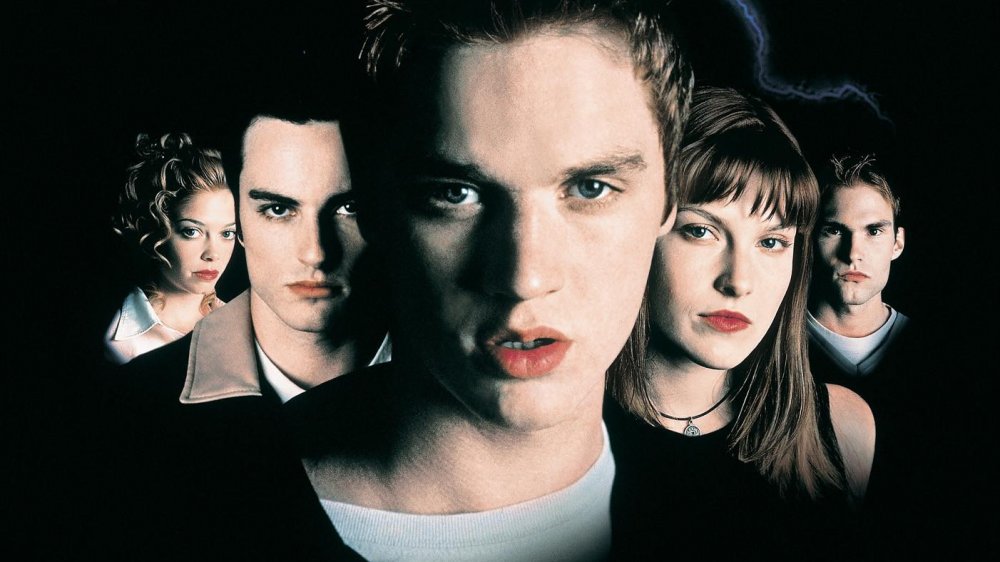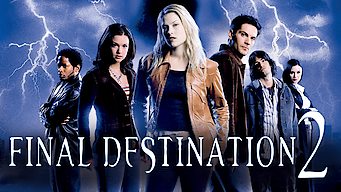The Final Destination franchise has become iconic for all of its glorious goriness, and after five films (And hopefully a sixth one on the way!) The series has definitely developed a strong and well-deserved place as a staple of horror cinema. But which is best? After rewatching the whole series over a few days, I decided to sit down and try and work that out. After I'd got over my fear of chairs. And computers. And, well, everything - I guess that's what intaking over 7 and a half hours of Final Destination style bloodshed will do to you.
5. THE FINAL DESTINATION

The fourth instalment in the series, 2009’s ‘The Final Destination’ has the air of a horribly average Final Destination film in the middle of a rebellious stage of teen angst and identity crisis. It’s all rock music, Mortal Kombat-Esque X-ray effects and an incredibly disappointing race track opening sequence, which - despite its seemingly good setting, what can't go wrong at a high-speed car race? - falls miles away from the brutality, intensity and sheer shock factor of some of the other films setups. It relies heavily upon its special effects to create some really gory deaths, such as the absolutely brutal mall explosion and escalator meat-grinder scenario, but a lot of them fall flat (both literally and figuratively) in a 2D setting as it is clearly much geared towards its original 3D release - a LOT of splattered blood and explosions. In fact, capitalising off of the 3D craze of the time seemed to be this film's whole purpose - who cares about plot when you can really see someone’s head explode right?
All of this combined, as well as its bland and uninteresting cast of entirely forgettable characters, some of (if not the) worst deaths in the whole franchise - getting crushed by an old guy's bath? Seriously? - and an absolutely terrible ending which feels entirely distant from the rest of the film and just a shoddy attempt to wrap everything up after a very intense buildup (which seems to be a common theme with a lot of this film's death sequences) places this film at the very bottom of the grouping. It’s not terrible, and unlike its inexplicably missing number, it doesn’t deserve to be ignored entirely - even if only for the racist guy burning to death - but it's a far cry from its predecessors and the final film which followed it.
4. FINAL DESTINATION
Putting this one so close to final destination 4 feels like some form of blasphemy - because this film is really good. And of course, the film that kicked it all off - ’Final Destination’ was a shock to the system when it came to the traditional horror slasher idea that to have scary and gory deaths you needed some form of a scary and gory killer - this release proved that idea wasn’t necessary at all and that maybe the scariest killer of all is simply just an entity - Death itself. Arguably the most plot-heavy instalment to the series (as one would expect, really), Final Destination established the rules and regulations of the films’ universe - basically just the idea that death has a design, and he really doesn’t like when you fuck it up.
In amongst setting the stage for itself and the films to follow, Final Destination still managed to throw in some impressive deaths, including the actual premonition at the start - that plane explosion is brutal and plays on a lot of peoples fears, something which this film does well. Unlike other films in the series, this one isn’t too bizarre yet, so between the use of various everyday objects and long sequences leading up to ultimately some grizzly deaths, it definitely creates a kind of fear that other horror movies can’t with the idea that there is not one singular threat, everything is a threat - and that really works for it. It’s not as fun or gory as some of the others, focusing more on that scare factor, but it’s still a fantastic introduction to the formula that the whole series follows and puts across a very thought-provoking ideology on the concept of death and the value of life - this is one clever film, and it being this low is simply only because of how well its successors built on the groundwork it laid out for them.
3. FINAL DESTINATION 2
The opening car crash sequence is immaculate - perfectly realistic but with that eerie and outlandish Final Destination edge to it, it stands head and shoulders above every other initial disaster the series offers. It wastes no time having to create any form of setup or lore too - it just jumps straight into some crazy, crazy deaths that only get better as the film goes on and with some gnarly sequences that, unlike in The Final Destination, really pay off. The dynamic of them not knowing each other before the pile-up is an interesting take, and leads to a super diverse group of people, but on occasion often leads to less of an emotional grit as none of these people share an emotional connection besides fear of death. The return of Clear Rivers is a nice callback to the first film as well, giving this instalment a lot to praise.
Unfortunately - perhaps down to the film having three writers, more than any of the others in the series - the plot feels a little convoluted. There’s a super confusing rule about how new life can beat death which, quite frankly, never made much sense to me - as well as a peculiar ending that leaves the two main characters somehow having escaped death, making them the only people in the series to do that, with no real explanation. (In a special edition of Final Destination 3 a newspaper article reveals they did die eventually, but it still doesn’t make a whole lot of sense.)
Finally, there is the disappointing revelation that Alex - the protagonist of the first film- who safety proofed his house, survived being electrocuted, crushed by a train and tons of other crazy shit throughout the entirety of the series’ previous entry - ended up being killed offscreen by nothing but a falling brick. The definition of a letdown.
So overall, these things earn this film a disappointingly low ranking - but its dark yet goofy spin on the Final Destination formula is solid, and watching a dude get sliced into three pieces by a fence is insane - so despite it being lower on the list, don’t pass it up.
2. FINAL DESTINATION 5
The final instalment in the franchise has everything you could want from a final destination film. There’s a shockingly dramatic opening sequence in true Final Destination tradition and some of the goriest and most suspenseful deaths of the whole series. It’s definitely one of the better films in the series if you’re into it for the gore factor but plot-wise it leaves something to be desired.
Maybe that’s because this has been done 5 times now, it’s hard to create something fresh and in the defence of this film, it did an incredible job at trying - both with a really interesting twist on the rules that you can take a life in place of your own, which added a whole other dark spin to the typical formula, and of course the incredible twist at the end, which truly blew my mind and was the reason the 5th and final film made it this high on my ranking - the whole film is a prequel to the events of Final Destination one, subtle hints are dropped but it’s almost impossible to know this until the very end when the two survivors are boarding a plane and the realisation - quite literally - blows up in your face. It is insane, and a fantastic end to the series that reverses all of the damage done by its mediocre 4th instalment with its intense series of completely jaw-dropping moments - I have genuinely never felt suspense like watching the Gymnastics scene in this film - it is a brilliant final film which sums up and showcases some of the best things about the Final Destination films - the incredibly crazy deaths.
1. FINAL DESTINATION 3
Perhaps an unpopular opinion, many seem to view this film as the moment the Final Destination films started to go a bit wrong - presumably due to the aforementioned complete and utter disaster that was the film that followed. But honestly, for me, Final Destination 3 has so many quirks and clever elements that elevate it just above every other entry in the franchise. It’s opening sequence, a rollercoaster crash, is enthralling and shocking in true final destination fashion and the fairground setting is really cool, especially when it comes to the true standout aspect of the film, much like the ‘signs’ referenced in final destination 2, photos taken at the fairground depict hints to the way each survivor is going to die. It’s a really fascinating aspect to the film which helps keep the formula fresh, and watching them try and figure out what the hints mean is captivating. It’s just such an intriguing element.
Another bonus is that this film is led by Mary Elizabeth Winstead (who is - as always - incredible) and just overall has a really interesting cast of characters. Ian Mckinley is still one of my favourite characters in the whole series (even if his whole personality is just a bad impression of JD from Heathers). Final destination 3 did a really solid job of balancing plot and gore - unlike some of the other instalments you actually feel for the characters while they’re dying brutally, and I’ll be damned if I’m not still terrified of tanning beds. I just really like how impactful this one is, and it works incredibly well as a standalone film, unlike the others in the series, which sort of come to rely on the no-plot-crazy-deaths gimmick a lot more.















 Support Me on Ko-fi
Support Me on Ko-fi 

